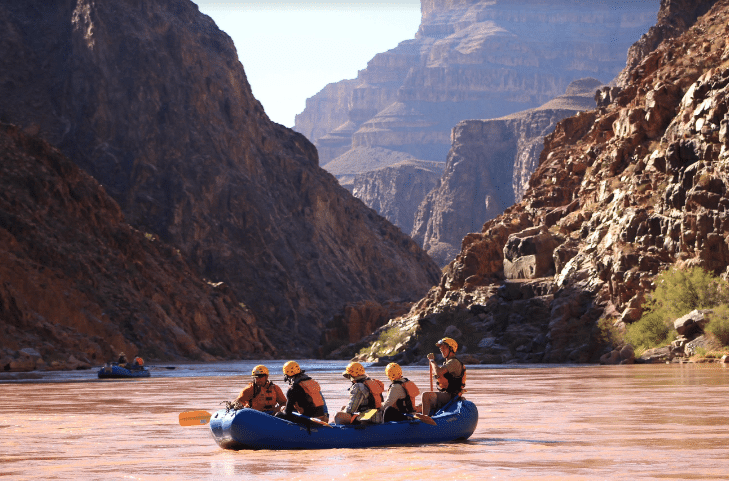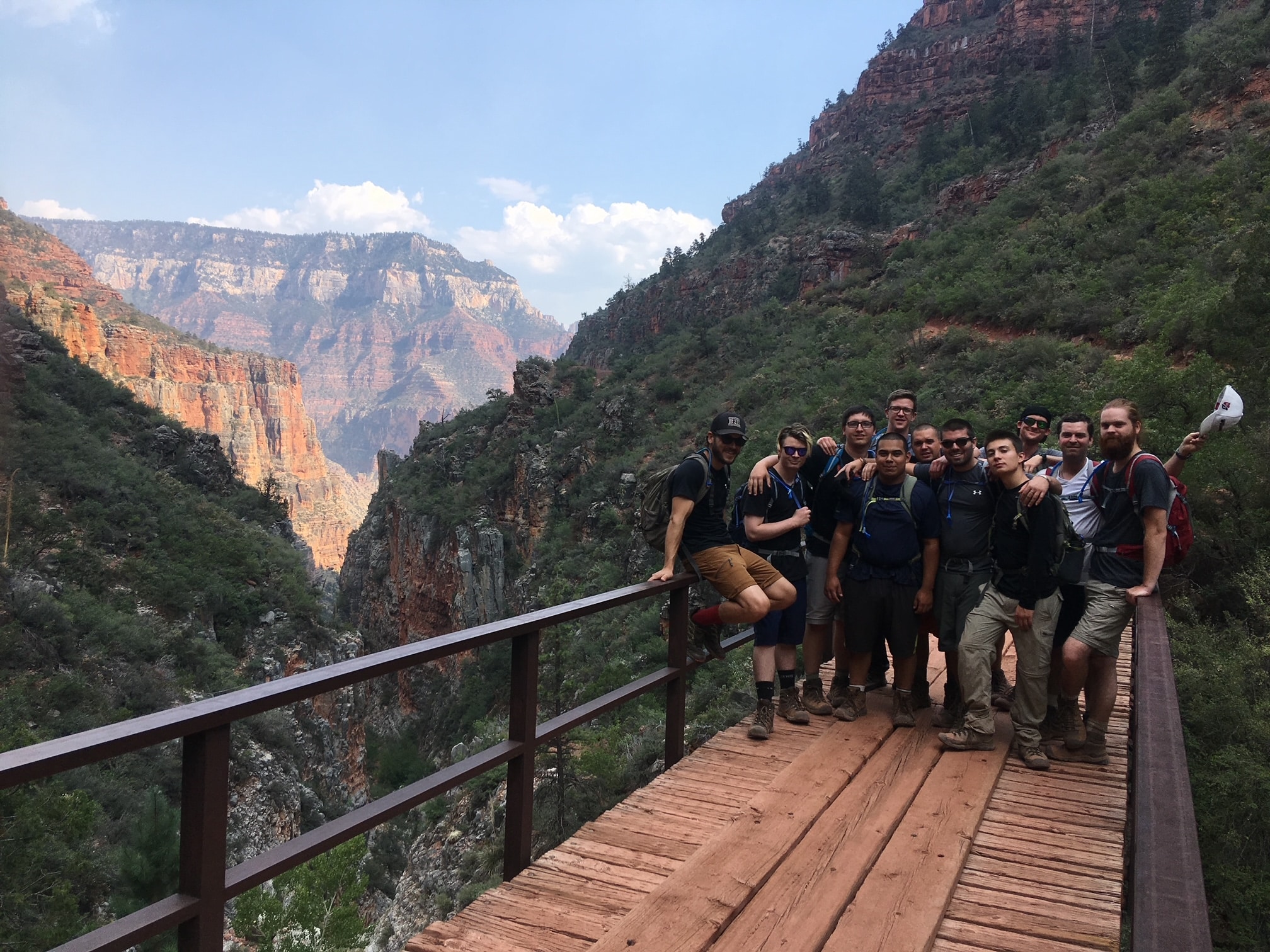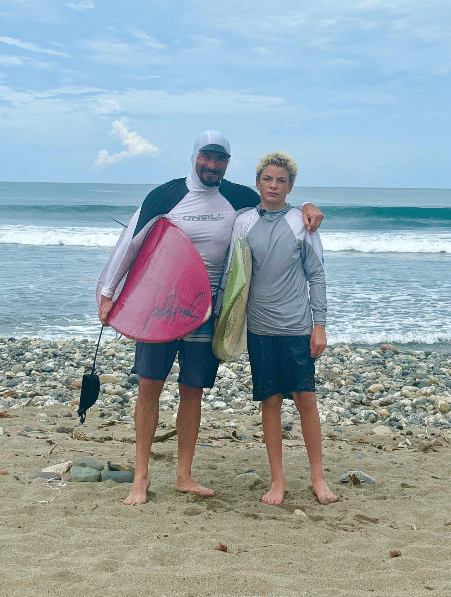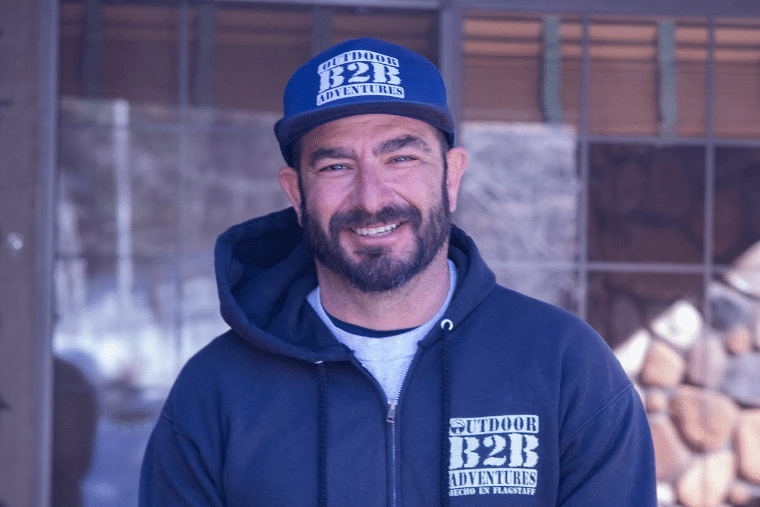For many people, the outdoors can offer wondrous sights, a sense of serenity and opportunities to stay in shape. When paired with traditional counseling methods and life-skill-building activities, the outdoors can also serve as a vital tool in addiction and mental health treatment, allowing patients to clear their minds and physically challenge themselves. That’s what NAU alumnus Roy DuPrez had in mind when he founded Back2Basics Outdoor Adventure Recovery in 2010, a rehabilitation program for young adult men featuring weekly wilderness therapy trips. Read on to find out how Back2Basics was formed, what brought DuPrez to Flagstaff and what the future holds for him and his program.
What brought you to NAU?
I was originally signed up to go to ASU. When my buddies and I came back from our summer vacations, we were all just hanging out on a late summer night down in Scottsdale, catching up and talking about next steps for the fall. The majority of them were switching over to NAU. We were all snowboarders in high school and NAU is right there next to Snowbowl. It definitely wasn’t a virtuous choice. I thought, “OK. My buddies are going, and I want to snowboard.” That’s where the seeds were planted. A week later, we got up here, signed a lease on an apartment, and it was a no-brainer. I really liked and continue to like being in this area. I’ve stayed since the fall of 1993.
I originally come from Venice Beach, California. I wasn’t going to have this comprehensive adult experience there. I am so grateful not only for the NAU incentive but also for how it has impacted the community we live in and provided the initial platform for who I am today.
How did your academic and professional careers lead you to founding Back2Basics in 2010?
Between completing my bachelor’s and master’s degrees, I co-founded an organization called the Indigo Movement, which was a 501c3 nonprofit specifically targeting adolescents. I work with adults now, but I was working with adolescents, and we had contracts with all the before- and after-care programs through the Flagstaff Unified School District. We ended up seeing this experiential learning benefit, and that was where the seeds were planted as far as approaching addiction and mental health with more experiential learning opportunities versus your traditional 30-day hospital model.

Back2Basics is more of a comprehensive experience throughout the week where Friday through Monday, our clients are going on expeditions to destinations like Moab, Zion, the Grand Canyon and Sedona. The other half of the week, they’re in more of a traditional clinical setting emphasizing life skills, going to the gym and completing community service projects. They are also maintaining their domestic environment with things like menu planning, food shopping and meal prep. We’re trying to offer an extensive menu of activities throughout the week to help them buy into what a genuine recovery experience can be and let them identify and gravitate to what will keep them motivated. A lot of my Back2Basics model stemmed from that observation of experiential learning years ago, and we’ve since applied it to an adult audience.
What inspired you to emphasize wilderness rehab as a key aspect of addiction recovery and mental health treatment?
When I proposed the hybrid model of traditional therapy and the outdoor wilderness therapy component, those were two separate camps. Nobody I proposed the idea to, even colleagues of mine, thought we could do both. They couldn’t really see the vision. Years later, most programs working with young adults are now adopting some sort of experiential level of care. I don’t think I’m reinventing the wheel as much as I’m threading the spokes for a more successful outcome. In my experience, Flagstaff has offered me a comprehensive platform for getting outside more.
I believe in clinical treatment, of course. That’s what we do; we provide an extensive staff made up of everyone from medical doctors to licensed therapists. But the outdoor component tells its own truth. We’re all going to digest nature differently. It’s going to be interpreted by the individual differently. That individual, if they’re open to it, is going to be able to see that this world is a big and beautiful place to be plugged into.
I’m dealing with an audience that tends to isolate and be closed off from what is possible and available to them. We’re just trying to introduce them to what is out there. We’re a long-term program, so they get this consistency in their schedules. We continue to put them in front of these experiences and use a “bring the body and the mind will follow” approach. We have enough time and opportunity to expose them to a variety of inspirational activities. Hopefully, they can eventually digest the beauty out there versus the sketchy circumstances and environments that they’re coming from before they get to us.
What do you hope the future has in store for you and Back2Basics?

Personally, I just want to continue to provide a curriculum, service and program where we don’t overcomplicate what is already working. I’ve been running this program for almost 15 years, and the pillars of that mission are pretty much the same. In this industry, programs like mine often get bought out by bigger entities and the treatment gets watered down. I want to keep the integrity of the program consistent for the long haul.
Tell us about a significant childhood memory and how it has impacted your life today.
I used to spend a lot of time in my early teen years with my dad in Mexico and traveling throughout the country with him. It’s not a specific incident, but it’s more so this general theme in my life back when I didn’t have the burden of paying bills or the concept of adult expectations. It was just this sweet spot where I probably took it for granted because I didn’t realize what was coming. I worked for my dad in his restaurant. I had money in my pocket and extensive friends with driving abilities. Teen social equity! Everything was smooth. I would say my era from seventh through ninth grade was a wonderful overall experience. And today, I don’t think I find myself wishing life was the way it was back then. I’m living my best life today. I have a good gig and wonderful opportunities as a result of sensible living.
What did you want to be when you grew up?
I really didn’t have a plan. I’m grateful and perplexed looking back. Most of the people I surround myself with tend to have a blueprint in life and think, “At this stage, I’ll be here” and “At that stage, I’ll be there.” I just didn’t. I had kind of a weird faith in the fact that it would all work out and kept putting one foot in front of the other.
My parents are in the food service industry, and I knew when I was younger that I didn’t want to do that. I worked in those restaurants growing up, washing dishes from an early age and seeing the hours that they had. My parents are a lot tougher than I am and were very hard workers.
Now, I just keep showing up and seeing what’s happening. If a door opens, cool. If it doesn’t, it wasn’t meant to be. I’m not trying to pretend I’m a spiritual guru who’s open to whatever, but I have always been into whatever is in front of me. If it seems of interest, let’s see what happens. I just stick with that formula rather than stressing for very long about what isn’t going to happen.
What have you been most proud of recently?

I just finished this surfing trip with my son over the last five weeks. He’s 13, and he’s been surfing since he was a young boy. We obviously are landlocked in Flagstaff, so we don’t go daily, but we have a house in southern Mexico that we’ll go to throughout the year and extended summers. I’ve loved seeing his progression with his own interests and watching him pursue an activity I’ve done since I was younger than him. There was this moment when we were just getting done surfing, and he and my buddy, who was his initial surf instructor, were walking in front of me on the beach framed by this ideal sunset. No picture could have captured that moment any better. It was perfect.
What is your favorite way to spend a day off?
As a CEO with all these titles overseeing different companies and organizations, the perfect day would just be staying home, hanging out at the house, waking up without an alarm clock or pending agenda, having a cup of coffee on the porch and, no clichés, but maybe going for a hike or taking the boat out. I might even do nothing but eat and hang out, watching a movie. That’s a perfect day for me at this stage in my career and life. I don’t want to feel ramped up to have to be somewhere. I just want to be.
What are three things on your bucket list?
I’m scheduled to travel more again this year and the next. I’d like to see the Mediterranean this fall by cruise ship, and I’m going to do that from Barcelona to Venice. I’d like to go to Japan next spring, and I’m trying to go to Uruguay in January. So, those are my immediate travel bucket list items. Other than that, I just want to make sure my son’s healthy and successful, so whatever I can do to support that journey.
Top photo credit: Caitlyn Anderson, The Lumberjack



